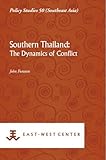Southern Thailand : The Dynamics of Conflict / John Funston.
Material type: TextPublisher: Singapore : ISEAS Publishing, [2008]Copyright date: ©2008Description: 1 online resource (81 p.)Content type:
TextPublisher: Singapore : ISEAS Publishing, [2008]Copyright date: ©2008Description: 1 online resource (81 p.)Content type: - 9789812308870
- 9789812308887
- DS588.S68 F87 2008
- online - DeGruyter
| Item type | Current library | Call number | URL | Status | Notes | Barcode | |
|---|---|---|---|---|---|---|---|
 eBook
eBook
|
Biblioteca "Angelicum" Pont. Univ. S.Tommaso d'Aquino Nuvola online | online - DeGruyter (Browse shelf(Opens below)) | Online access | Not for loan (Accesso limitato) | Accesso per gli utenti autorizzati / Access for authorized users | (dgr)9789812308887 |
Browsing Biblioteca "Angelicum" Pont. Univ. S.Tommaso d'Aquino shelves, Shelving location: Nuvola online Close shelf browser (Hides shelf browser)

|

|

|

|

|

|

|
||
| online - DeGruyter Poverty Reduction through Sustainable Fisheries : Emerging Policy and Governance Issues in Southeast Asia / | online - DeGruyter Strategic Currents : Emerging Trends in Southeast Asia / | online - DeGruyter Three Sides in Search of a Triangle : Singapore-America-India Relations / | online - DeGruyter Southern Thailand : The Dynamics of Conflict / | online - DeGruyter Islam and the Secular State in Indonesia / | online - DeGruyter Pacific Food System Outlook 2008-2009 : Climate Change and the Food System / | online - DeGruyter Labour Mobility in the Asia-Pacific Region : Dynamics, Issues and a New APEC Agenda / |
Frontmatter -- Contents -- List of Acronyms -- Executive Summary -- Southern Thailand -- Muslims in Southern Thailand -- Peaceful Decades -- Return of Violence -- Religion and the Insurgency -- Conclusion -- Endnotes -- Bibliography -- Appendix -- Internal Conflicts and State-Building Challenges in Asia. Project Information
restricted access online access with authorization star
http://purl.org/coar/access_right/c_16ec
This monograph examines the tragic conflict in Thailand's southern Muslim-majority provinces near the border with Malaysia. Although the conflict has attracted wide national and international interest, no agreement exists on the cause of the resumption of violence in an area that had remained free of major conflict for two decades. This monograph critically examines explanations for the conflict and traces its evolution from the early 1990s to the beginning of the Samak government in 2008. The study points to a wide variety of factors that were important in the resumption of the conflict, with policies of Prime Minister Thaksin Shinawatra being critical in determining the timing and intensity of the violence. These conditions include: (1) the resumption of an age-old conflict between Malay Muslims from Pattani, Yala, and Narithiwat Provinces against a discriminatory central government; (2) entrenched problems of criminality in an area far from the capital and with a porous border with Malaysia; (3) the disbanding of important conflict resolution institutions by former Prime Minister Thaksin, who then gave priority to hard line (sometimes extrajudicial) security policies; (4) growing Islamic religiosity, influenced by regional reform movements and international developments, including the example of extremist movements such as Jemaah Islamiyah; and (5) the growth of southern insurgent movements - which have never issued public demands and whose real leaders remain unknown. In this complex setting, no resolution to the violence appears likely in the near future, as Thaksin's main policies have been retained since the September 2006 coup that ousted his government.
Mode of access: Internet via World Wide Web.
In English.
Description based on online resource; title from PDF title page (publisher's Web site, viewed 01. Dez 2022)


